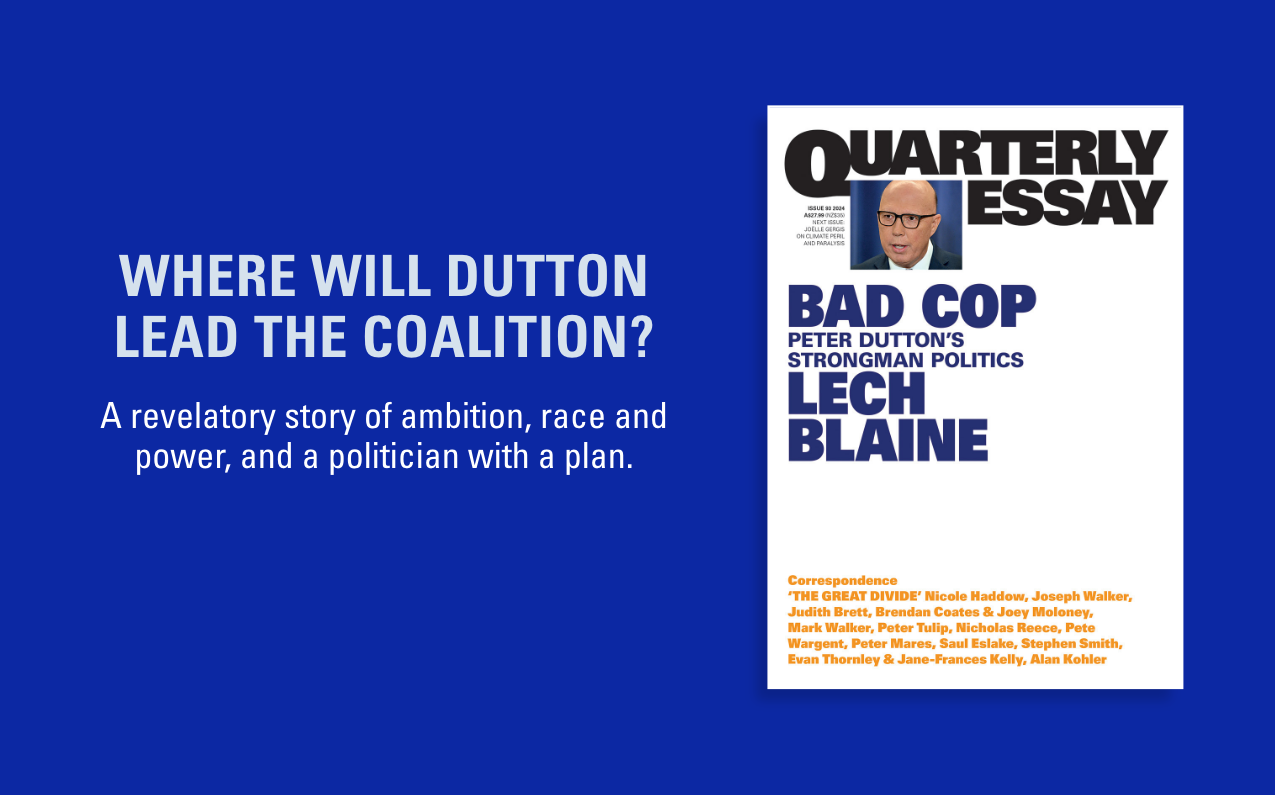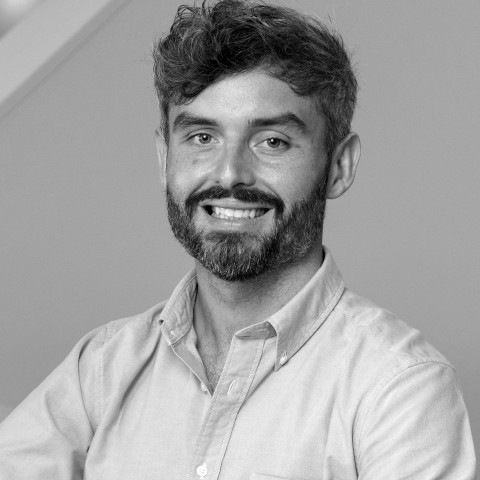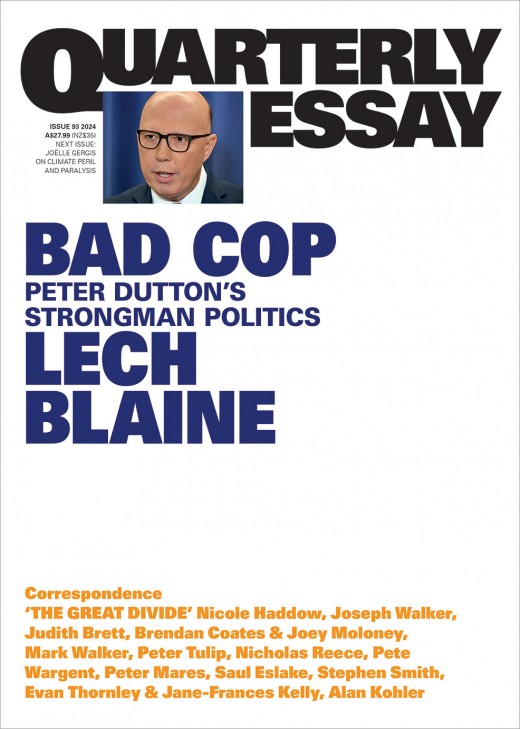News

News > Extract
Read an extract from Bad Cop
Read an extract online from Bad Cop by Lech Blaine
Peter Dutton eats bleeding-heart lefties for breakfast. He is tall and bald, with a resting death stare. His eyes – two brown beads – see evil so that the weak can be blind. His lips are allergic to political correctness. Peter preaches the gospel of John Howard with the fanaticism of Paul Keating. He wants to do the Labor Party slowly, slowly, slowly, and defeat the woe-is-me heroism of identity politics.
“It’s a movement that seeks to define and divide us by class, sex, race, religion and more besides,” said Dutton in 2023. “Worse, such movements seek to undermine traditional values of ambition, gratitude and forgiveness and replace them with resentment, envy and anger.”
Once upon a time, the federal Opposition leader was a cop in clammy Queensland. He was a listener, a lurker, a watcher; not a storyteller, nor a performer. He set traps for suspects and waited for them to make a mistake. For poker-faced Dutton, leadership isn’t about kissing the cheeks of babies, or the arses of journalists. It is about bleeding for your beliefs and denying the griefs of your enemies. White lies are often the cost of beating the bad guys. “In a different age, we’d be clashing swords,” Dutton told journalist Madonna King in 2014. “I see myself as a contestant in that battle.”
In May 2022, Australia just so happened to elect a good cop as prime minister. Anthony Albanese promised a cuddlier, less bloodthirsty form of leadership. “Safe change,” with a patient embrace of democratic rituals. He got a two-seat majority on the basis of not being Scott Morrison. Labor gained nine seats, and lost one to the Greens. The Liberal party room bled seventeen members. A coup had been staged in six of the Liberals’ most blue-chip seats by teal independents. Professional women in inner-city seats had been forsaken in the Coalition’s pursuit of materialistic, politically incorrect men.
After Morrison, there was only one serious contender left standing: Peter Dutton. If the Liberals hadn’t lost six seats to the teal independents, Josh Frydenberg was the obvious next Opposition leader. At the very least, he would have been waiting in the wings to replace Dutton. The 2022 election erased Frydenberg as a direct leadership rival. And it removed a posse of moderate MPs who would have agitated against Dutton’s vision for where the Liberal Party should be heading politically. “I grew up in a working- class suburb with two loving parents who were hard-working small business people,” said Dutton in his acceptance speech.
Dutton’s ascension showed how the Liberal Party had changed, both electorally and culturally. He was the first federal Liberal leader from Queensland, the backwater state that became electoral bedrock for the Coalition and an electoral roadblock for Labor. Queensland is different. For one thing, the Liberals and Nationals are a merged entity: the Liberal National Party. The alternative prime minister and deputy prime minister – David Littleproud, the Nationals’ leader – are both members of the LNP. “There is not a cigarette paper of difference between the two parties,” said Dutton in 2023, regarding the federal Liberals and Nationals. In the opinion of a former LNP federal minister, Dutton is ideologically “to the right” of Littleproud.
Six of the first seven federal Liberal leaders were from Victoria. Six of the next seven first-time Liberal leaders were from Sydney. In the 1970s, the ideological heartbeat of the Liberal Party began migrating north: from Victoria, through New South Wales, and finally to the Sunshine State.
“The most toxic thing that happened to the Liberal Party brand was the Liberals and Nationals coming together as one party in Queensland,” says a former Liberal federal cabinet minister from Victoria. “It was basically a National takeover of the Liberals. That was never going to fly in Melbourne.”
For all the babble about inner-city elites after Howard, the Liberals continued to draw leaders from the south. Brendan Nelson was a doctor and former president of the Australian Medical Association who held a seat on Sydney’s North Shore. Tony Abbott and Joe Hockey – North Shore private schoolboys – were replaced as prime minister and treasurer by Malcolm Turnbull and Scott Morrison, GPS boys from Sydney’s eastern suburbs.
Dutton isn’t so happy-go-lucky. He views the world with the pessimism of a Russian novelist. The son of a Brisbane bricklayer, he bombed out of university to become a copper. His earnest conservatism comes from the gut instincts of a suburban upbringing and the racial tensions of being a police officer in Queensland; not from the anti-abortion bootcamps of Bob Santamaria, nor the sermons of Brian Houston.
“I am not the evangelical here, not out and proud on abortion,” Dutton told Niki Savva for her book Plots and Prayers. “I voted for gay marriage.”
Dutton hasn’t fabricated an identity based on feedback from focus groups. “ScoMo” spoke like a NIDA student’s idea of a Queenslander. “Dutts,” as mates call him, doesn’t strain for an ocker accent or drape himself in sporting paraphernalia. His persona? A sombre straightshooter. One tough hombre. The bad cop.
Some liberals worry that gung-ho Dutton lacks the soft touch required to rebuild John Howard’s broad church. He is popular with “the base.” But not so much with female professionals. Liberal MP Bridget Archer, from Tasmania, feels marginalised with fewer moderates around. “When I go to Canberra and sit in the party room with Peter Dutton, Tony Pasin and Alex Antic, I think: who are these people?’
Archer claims that her views haven’t changed: the party itself is shifting to the right. “The Liberal Party has become One Nation lite,” she tells me.
*
On becoming leader, Dutton made it clear that he wasn’t losing a great deal of sleep over the seats lost to the teals. The downsized party room wouldn’t allow him much wriggle room on climate change and social issues.
“Our policies will be squarely aimed at the forgotten Australians, in the suburbs, across regional Australia,” he said, adapting Robert Menzies’ phrase.
This is the cultural landscape that Dutton came from. He is a Howard battler gone gangbusters: a copper turned property developer with a distrust of limp-wristed intellectuals, plus a requited lust for money. Hence he emphasises bad memories from his nine-year career as a cop, rather than happier memories from a three-decade hot streak as a property investor.
Many of Dutton’s detractors underestimate the popularity of cops. In the 2021 Reader’s Digest Australia Most Trusted Brands Survey, police officers were ranked sixth on the list of most trusted occupations, between scientists at fifth and schoolteachers at seventh. In contrast, journalists were twenty-ninth. Politicians – at rock bottom – were below delivery drivers, bouncers and influencers. Dutton’s biggest roadblock to the public liking him isn’t that he was a copper once, but that he decided to become a politician.
Share this post
About the author
Lech Blaine is the author of the memoir Car Crash and the Quarterly Essays Top Blokes and Bad Cop. He is the 2023 Charles Perkins Centre writer in residence. His writing has appeared in Good Weekend, Griffith Review, The Guardian and The Monthly. His latest book is Australian Gospel.
More about Lech Blaine




